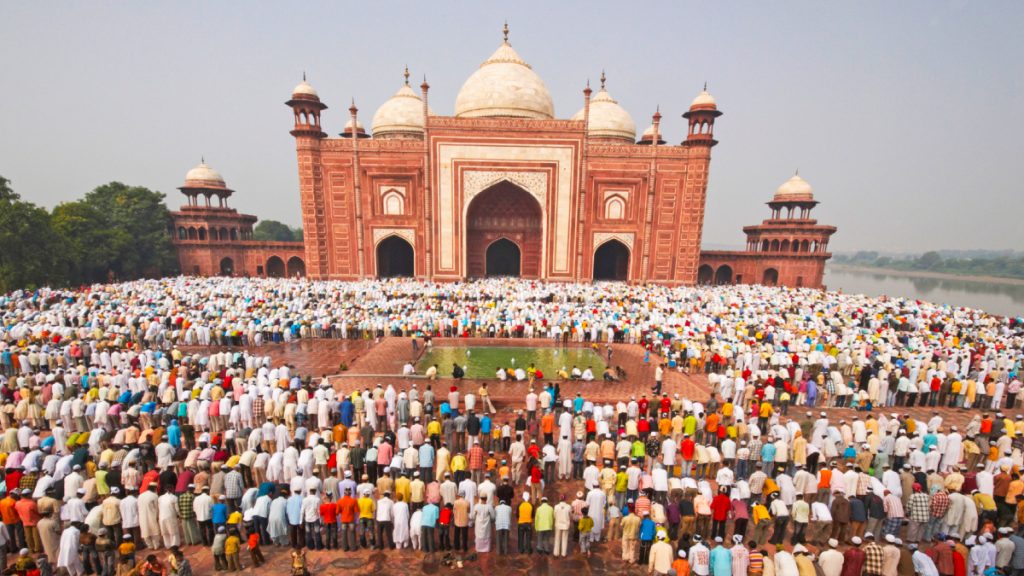Id-ul-Fitr, also known as Eid al-Fitr, is one of the most significant Islamic festivals celebrated by Muslims around the world, including in India. It marks the end of the holy month of Ramadan, a period of fasting, prayer, and reflection. On this day, Muslims break their month-long fast, offer special prayers (Salat al-Eid), and celebrate with feasts and acts of charity. The festival is a time for communal harmony, gratitude, and sharing joy with family, friends, and the less fortunate.
Id-ul-Fitr Dates for 2024, 2025, and 2026
To help you keep track of when Id-ul-Fitr falls in the upcoming years, here are the dates:
| Year | Date | Day |
|---|---|---|
| 2024 | 10/04/2024 | Wednesday |
| 2025 | 31/03/2025 | Monday |
| 2026 | 20/03/2026 | Friday |
The Significance of Id-ul-Fitr
Id-ul-Fitr signifies the completion of Ramadan, the ninth month of the Islamic calendar, during which Muslims fast from dawn to sunset. Fasting during Ramadan is one of the Five Pillars of Islam and is observed as a means of purifying the soul, practicing self-discipline, and developing empathy for the less fortunate.
The festival of Id-ul-Fitr is also a time for Muslims to express gratitude to Allah for providing strength and patience throughout the month of fasting. It is a joyous occasion where forgiveness and compassion are encouraged, and the sense of community is strengthened through prayers, feasting, and giving charity (Zakat al-Fitr).
How Id-ul-Fitr is Celebrated
The celebration of Id-ul-Fitr begins with special prayers known as Salat al-Eid, which are offered in congregation, usually in large open spaces or mosques. The prayers are followed by a sermon, and then the festivities begin. Here are some key elements of the celebrations:
- Morning Prayers: Muslims gather for special Eid prayers in mosques or outdoor prayer grounds. These prayers are a central part of the Id-ul-Fitr celebrations, and they are performed in congregation with the community.
- Charitable Giving (Zakat al-Fitr): Before the prayers, Muslims give Zakat al-Fitr, a form of charity that is mandatory for those who can afford it. This donation ensures that even the less fortunate can participate in the celebrations. It is typically given in the form of food or money.
- Feasting and Celebrations: After the prayers, families and friends come together to share elaborate meals. Traditional dishes such as biryani, kebabs, sheer khurma (a sweet vermicelli dessert), and various other delicacies are prepared. The day is spent visiting relatives, exchanging gifts, and celebrating the end of Ramadan.
- Wearing New Clothes: On Id-ul-Fitr, it is customary to wear new or the best available clothes as a symbol of renewal and joy. People often dress in traditional attire, adding to the festive atmosphere.
- Acts of Charity and Kindness: Id-ul-Fitr is a time for giving and sharing. Many Muslims engage in acts of charity, ensuring that the less fortunate also have the opportunity to celebrate Eid. Visiting orphanages, hospitals, and giving food to the needy are common acts of kindness during this festival.
Id-ul-Fitr in Different Parts of India
Id-ul-Fitr is celebrated with great fervour across India. Although the customs may vary slightly from region to region, the essence of the festival remains the same – gratitude, joy, and community spirit.
- North India: In states like Uttar Pradesh and Delhi, large congregations for prayers are held in mosques and open grounds. Feasts with family and friends, along with visits to relatives, are common in these regions.
- South India: In states like Tamil Nadu and Kerala, Id-ul-Fitr is marked by prayers in mosques, followed by communal meals that feature local delicacies such as biryani, haleem, and payasam.
- West Bengal: In Kolkata and other parts of West Bengal, Id-ul-Fitr is celebrated with grand feasts, family gatherings, and the exchange of sweets and gifts.
Id-ul-Fitr – A Day of Gratitude and Celebration
Id-ul-Fitr is a time of joy, gratitude, and reflection. It is not only a celebration of the end of Ramadan but also an opportunity to foster stronger ties within the community. Through prayers, charity, and acts of kindness, Muslims reaffirm their faith and their commitment to living with compassion and empathy. Id-ul-Fitr serves as a reminder of the importance of sharing blessings and spreading happiness to all, regardless of background.
Popular FAQs about Id-ul-Fitr
- Is Id-ul-Fitr a public holiday in India? Yes, Id-ul-Fitr is a gazetted public holiday in India. It is observed across the country, though the exact date may vary depending on the sighting of the moon.
- Why is Id-ul-Fitr celebrated? Id-ul-Fitr is celebrated to mark the end of Ramadan, the Islamic month of fasting. It is a time to express gratitude to Allah for providing strength during Ramadan and to celebrate with family and community.
- What are the main traditions of Id-ul-Fitr? The main traditions of Id-ul-Fitr include offering special prayers, giving charity (Zakat al-Fitr), feasting with family and friends, wearing new clothes, and exchanging gifts.
- How do Muslims prepare for Id-ul-Fitr? Muslims prepare for Id-ul-Fitr by giving Zakat al-Fitr (charity), performing special Eid prayers, preparing festive meals, and gathering with family and friends to celebrate the completion of Ramadan.

